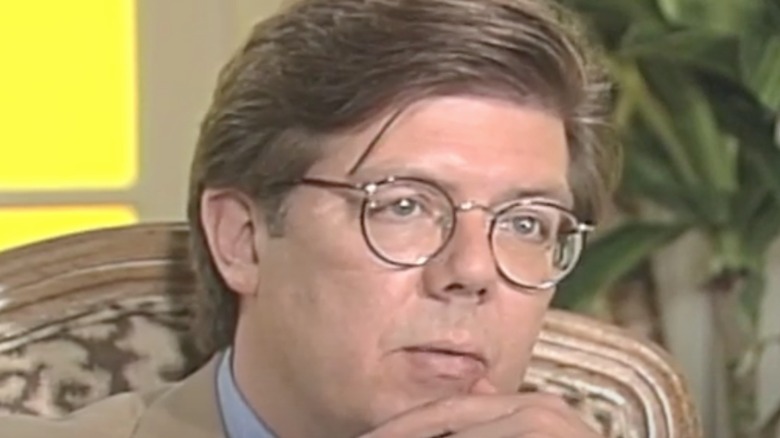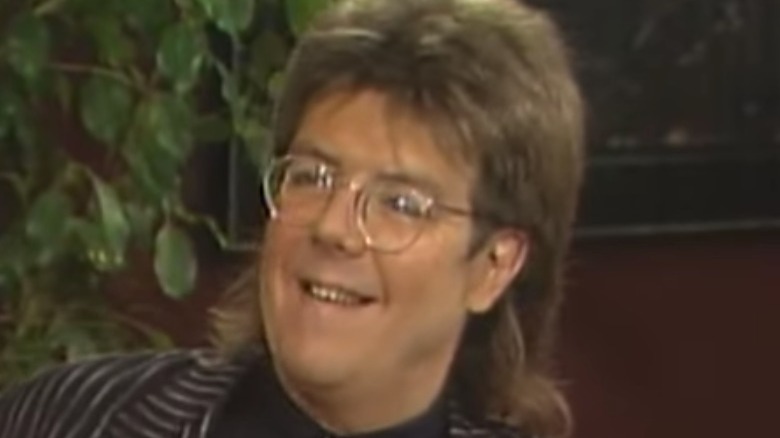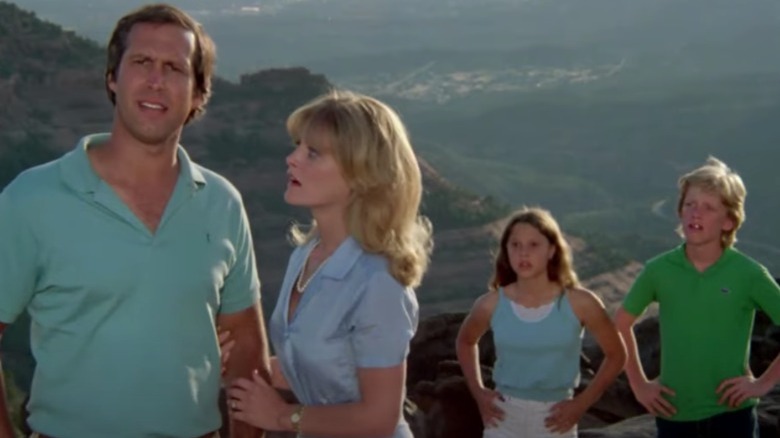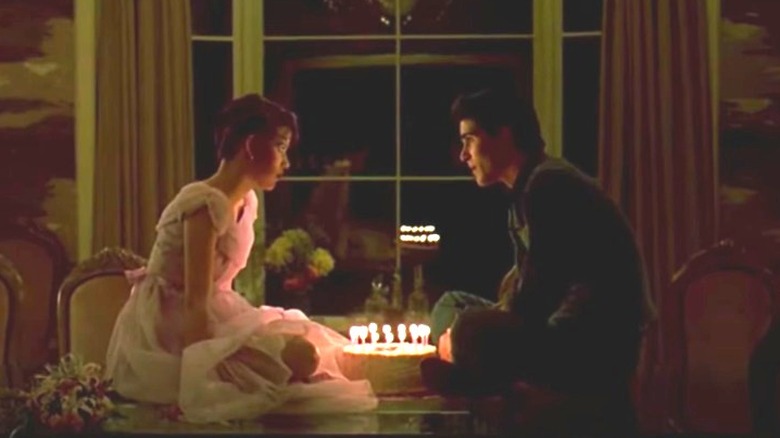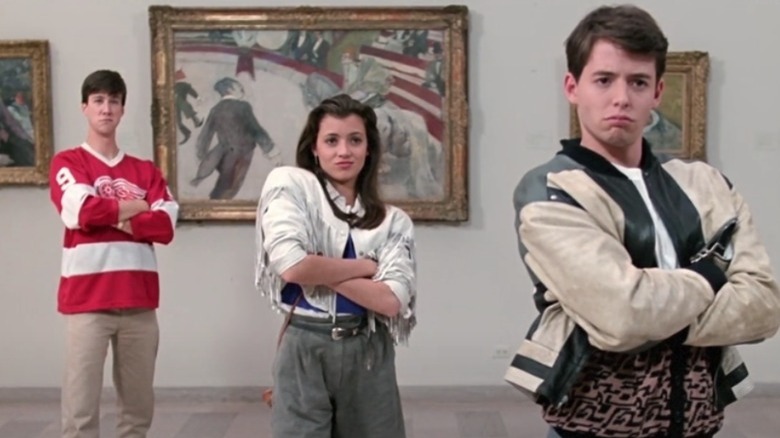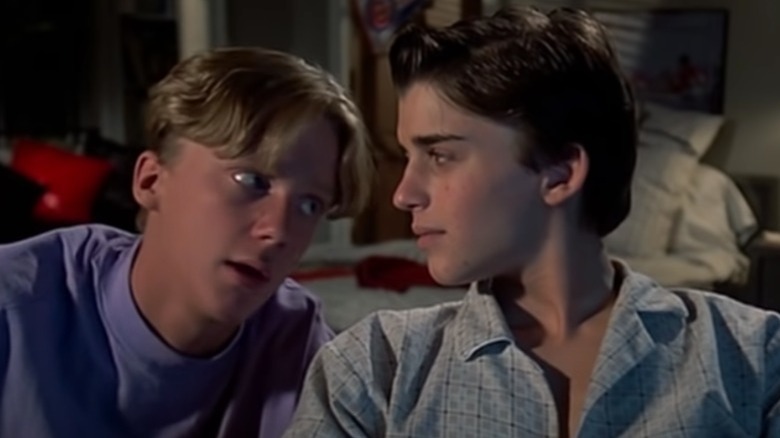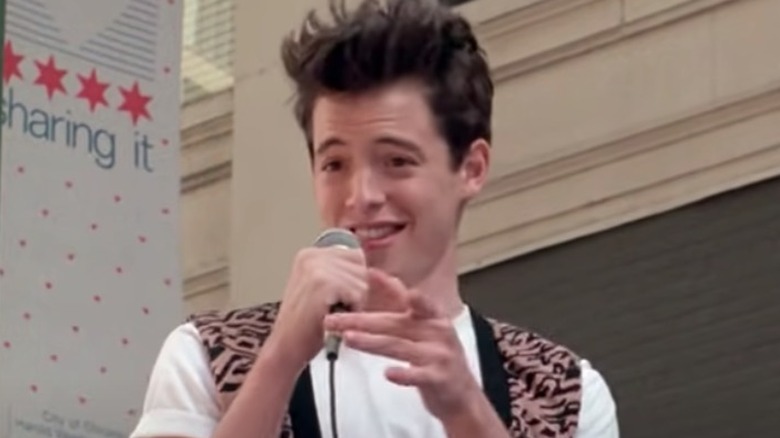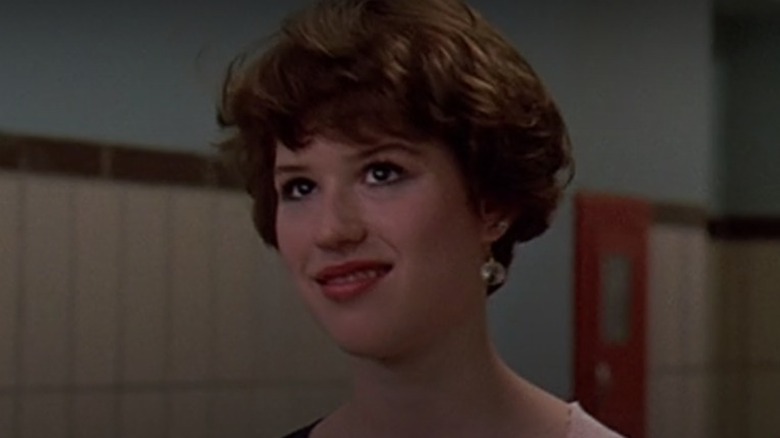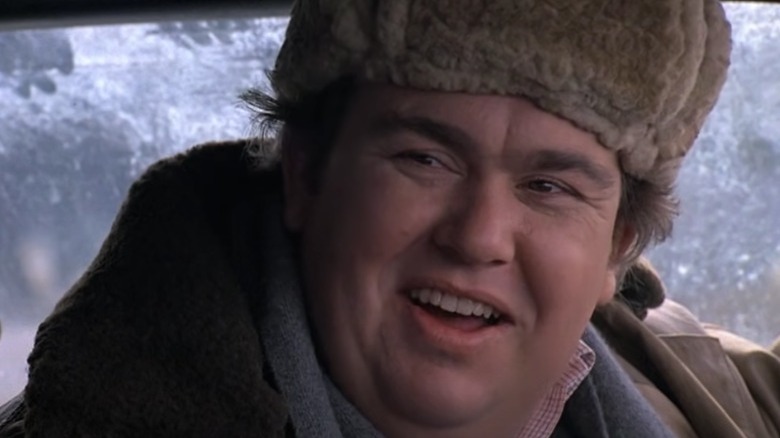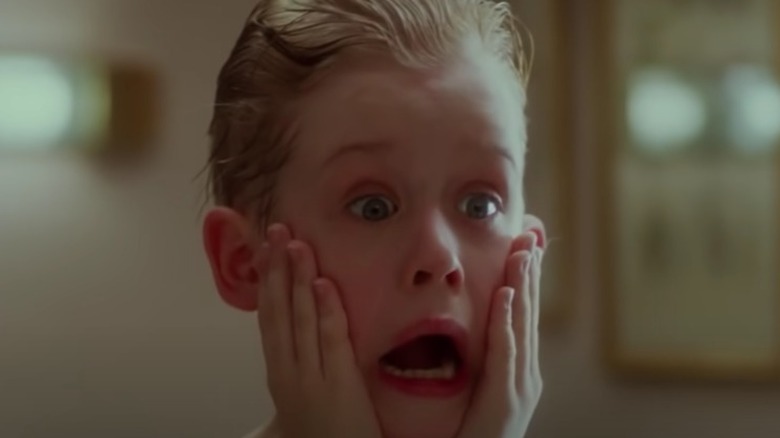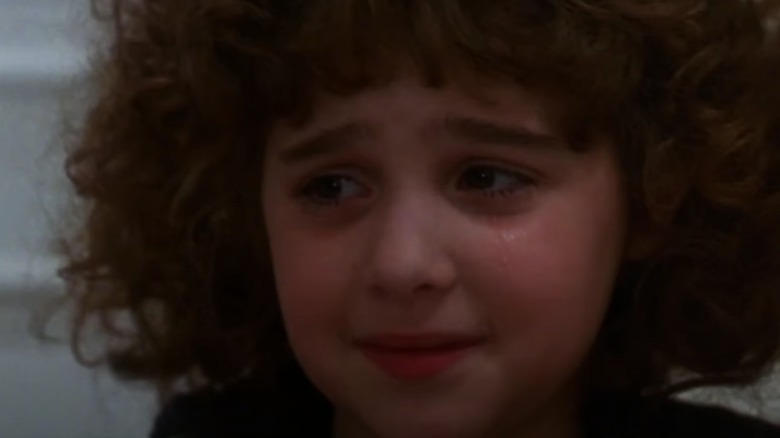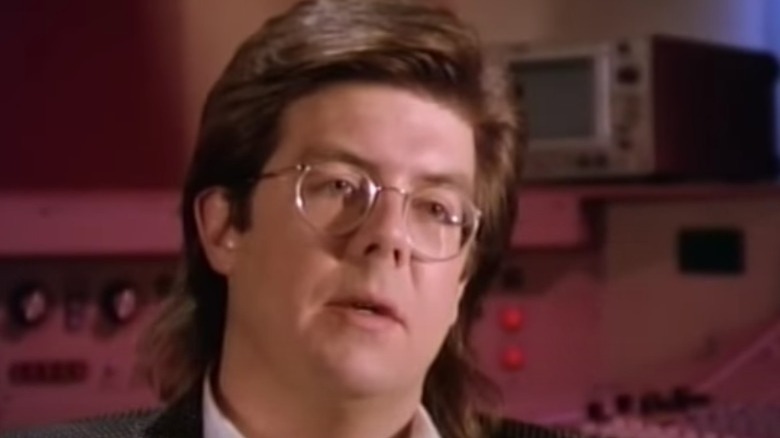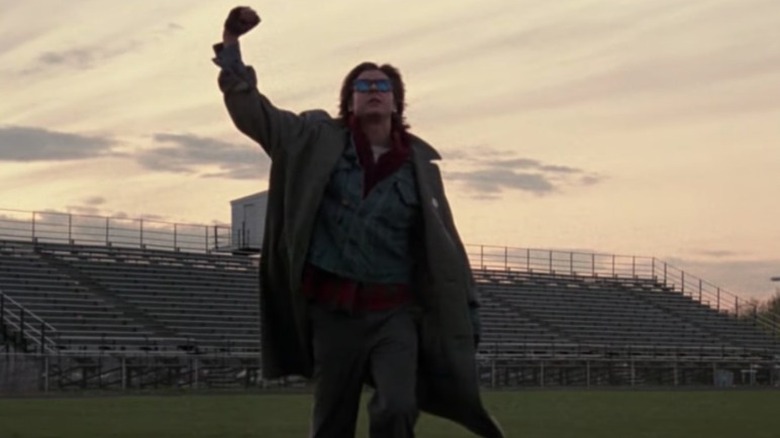The Untold Truth Of John Hughes
Few American film auteurs captured the American zeitgeist of the '80s and early '90s more deftly, astutely, and hilariously than John Hughes. Hughes is perhaps most famous for his empathetic, character-driven, and impeccably soundtracked explorations of teen angst (at least the white suburban teen kind) in such classics as "The Breakfast Club" and "Pretty in Pink." Beyond that, he is also responsible for uproarious yet heartfelt comedies like "National Lampoon's Vacation," "Planes, Trains and Automobiles," not to mention the wildly successful "Home Alone" franchise.
However, the man who gave voice to legendary wiseguys Ferris Bueller and Kevin McCallister also had a darker side and could be capricious, controlling, and difficult to work with. The driven and at times tempestuous writer/director/producer died from a heart attack in 2009 at the relatively young age of 59 but was incredibly prolific at his peak. Let's take a deeper dive into the work and personality of this beloved yet complicated filmmaker.
Before he was a filmmaker, Hughes worked in advertising
Before John Hughes went Hollywood, he went to Madison Avenue. A college dropout, Hughes didn't have academic credentials, but he had a knack for humor. While scraping together a living performing odd jobs, Hughes was a freelance gag writer for comedians like Rodney Dangerfield and Joan Rivers. He occasionally saw his jokes performed on TV shows like "The Tonight Show," but living by-the-joke at $10 per gag wasn't feasible for Hughes (via Vanity Fair). Cobbling together a portfolio of yuks, Hughes sought work in advertising and landed a job at prestigious advertising agency Leo Burnett. He rose through the ranks at Leo Burnett and eventually ended up working on prestigious accounts like Virginia Slims.
Sure, Hughes had come a long way, baby, but getting people to buy cartoonishly long cigarettes was not his calling. However, the ad work brought him to New York City, headquarters for National Lampoon magazine. Working for National Lampoon was Hughes' dream. While still at Leo Burnett, he wrote for the magazine, collaborating with then-managing editor P.J. O'Rouke on pieces like "National Lampoon Sunday Newspaper Parody." With his work at the National Lampoon taking off, Hughes traded in his gray flannel suit for a featherweight mullet, leaving Leo Burnett in 1979 to pursue comedy writing full time (via Huff Post).
Hughes' National Lampoon story 'Vacation '58' kicked off his film career
John Hughes' screenwriting career kicked into gear with a serendipitous proposition by Warner Bros. Hughes joined the National Lampoon staff in 1979, and with the success of the movie "National Lampoon's Animal House," Hollywood was open to pitches from the Lampoon crew. Hughes, according to P.J. O'Rourke, "was the one who took it seriously and had the vocabulary for it," earning his first screenplay credit 1982's "National Lampoon's Class Reunion," a horror-movie spoof set at Lizzie Borden High School (via Vanity Fair).
Despite Hughes' inauspicious screenwriting debut, he had luck on his side. According to Vanity Fair, Warner Bros. had bought the rights to "Vacation '58," his short story about the Griswold family's ill-fated cross-country trek to Disneyland, published in the National Lampoon in 1979. The studio invited Hughes to write the adapted screenplay, and he took them up on the offer. Hughes didn't direct "National Lampoon's Vacation," as that job was taken by Harold Ramis. However, Hughes' lack of control over the final product proved so irksome to him that it would serve as the impetus for him to direct his own screenplays.
Hughes was a prolific writer
John Hughes was a prolific writer of legendary proportions. He cultivated his work ethic in the advertising and magazine worlds, applying the ethos of deadline-driven writing to "grinding the scripts out." Spy Magazine noted that before he even got a film produced, Hughes had already completed 15 screenplays (via Hollywood Elsewhere), and the ones that made it to the big screen were finished with astonishing speed. According to actor Molly Ringwald, Hughes wrote "Sixteen Candles" in mere days, a feat so impressive that movie executives decided that film, rather than "The Breakfast Club," would be Hughes' directorial debut (via Vanity Fair). He also wrote the script for "Ferris Bueller's Day Off" in less than a week. For Hughes, at least on the written page, life moved pretty fast.
Hughes was constantly writing, and not just screenplays. His penchant for the written word was "compulsive." According to Vanity Fair, Hughes rarely left his house without a notebook in his later years, jotting down observations, thoughts, or inspirations. His protracted email correspondences were packed with Hughesian riffs on the day. When he died in 2009, Hughes had already written a stack of letters for his then-eight-week-old son to read.
Most of Hughes' movies were made in the Chicagoland area
Great artists are often inspired by their natural surroundings. Claude Monet had the lush gardens of Giverny, Georgia O'Keeffe observed the craggy topography of New Mexico, and John Hughes was surrounded by the Colonial-style homes of Chicago's northern suburbs. Hughes grew up in Grosse Pointe, Michigan, and Northbrook, Illinois, affluent midwestern suburbs filled with tree-lined streets and tidily kept homes. These locales served as inspiration for the fictional town of Shermer, Illinois, the primary location for many of Hughes' films. David Kamp observed in Vanity Fair, "Hughes' Shermer was partly Northbrook and partly a composite of all the North Shore's towns and neighborhoods — and, by extension, all the different milieus that existed in American suburbia."
Hughes was devoted to his hometown, so much so that even as a novice filmmaker, he insisted to Universal Pictures that his films were shot in Northbrook (via The New York Times). He even stridently told Roger Ebert, another titan of Chicago-based filmdom, "I'm going to do all my movies here in Chicago." Hughes might have believed the midwest was best when it came to his films, but he clashed with Hollywood executives on the issue. Spy Magazine reported that when Universal Pictures forced Hughes to complete editing on "The Breakfast Club" in Los Angeles, Hughes was so appalled that he got out of his contract with the company and signed a new deal with Paramount Pictures (via Hollywood Elsewhere).
Hughes respected teenagers and wanted to tells stories about and for them
Dubbed the "Philosopher of Puberty" and the "Auteur of Adolescent Angst," John Hughes' uncanny talent for youth-speak endeared him to teenagers just looking to be understood (via NPR). Crossing a generational divide, Baby-Boomer Hughes crafted the tenor of Generation X teen life. In his 30s and during the height of his teen-movie career, Hughes was old enough to be the adult in the room but young enough to attune himself to adolescent concerns. And, unlike other oldsters, he took those concerns seriously. In 1984, in an interview about "Sixteen Candles" and "The Breakfast Club," Hughes told Roger Ebert, "People forget that when you're 16, you're probably more serious than you'll ever be again." Hughes made films that saw teenagers in their wholeness, not just exploitative stereotypes.
The key for unlocking '80s teenagedom for Hughes was characters. Hughes observed of his filmmaking process, "You get the characters right, you get the reality ... and everything else will follow." Upon the release of "Sixteen Candles," star Molly Ringwald felt like her character, Samantha, accurately reflected teenage girls (via Roger Ebert). Those who worked with Hughes as teenagers noted: "that, unlike any other adult they knew, Hughes had ready and vivid access to his own adolescence and the feelings it engendered" (via Vanity Fair).
His love of music informed his work
John Hughes loved music and it was an all-consuming passion that his films highlighted (via Vanity Fair). Consider sequences such as Ducky Dale's (Jon Cryer) passionate lip-sync of Otis Redding's "Try a Little Tenderness"; John Bender (Judd Nelson) triumphantly pumping his fist in the air to "Don't You (Forget About Me)" by Simple Minds; Samantha (Molly Ringwald) finally making her birthday wish come true to "If You Were Here" by Thompson Twins. All of these iconic scenes were realized by pairing memorable moments with the perfect song.
Hughes came of age in the '60s when pop music's ubiquitousness permeated the culture, influencing Hughes' films of the '80s. Hughes noted that while making "Ferris Bueller's Day Off," he "'listened to 'The White Album' every single day for 56 days' while shooting the movie" (via Far Out). Ferris (Matthew Broderick) quotes John Lennon in the movie and joyously swivels to "Twist and Shout" by The Beatles. But Hughes' musical proclivities were not stuck in his past. He took contemporary cues from teens like Molly Ringwald, who told Vogue that she introduced him to The Psychedelic Furs track "Pretty In Pink," inspiring him to write a screenplay loosely based on the song.
According to music supervisor Tarquin Gotch, who worked with Hughes on movies like "Ferris Bueller's Day Off," Hughes was extremely invested in the music of his films, staying up all night to find the right song for the right moment (via Synchtank). Having music in a Hughes film significantly impacted musicians' careers, with Gotch noting that even decades after a film's release, it acts as a de-facto seal of approval.
Hughes had a successful, yet complicated working relationship with Molly Ringwald
Molly Ringwald's working relationship with John Hughes started before they even met. Ringwald recounted to Vanity Fair that, as the story goes, Hughes found a headshot of her while casting "The Breakfast Club," and was so enamored with the photo that "he put my headshot on the bulletin board by his desk and wrote 'Sixteen Candles' over a weekend. And when it came time to cast it, he said, 'I want to meet her: that girl.'"
Hughes not only met "that girl," but he and Ringwald worked on a trio of generation-defining films together: "Sixteen Candles," "The Breakfast Club," and "Pretty In Pink." They became close collaborators, with Ringwald writing in The New York Times, "John saw something in me that I didn't even see in myself." But Ringwald wasn't just a girl in a photograph. She was a maturing young adult who desired growth and sought work with other filmmakers. As a result, Hughes, who could hold a "supernatural" grudge, didn't speak to her for more than 20 years.
Eventually, Ringwald extended an olive branch to Hughes, writing to him toward the end of his life. He responded by sending her an extravagant floral arrangement, and she accepted the gesture as closure on their relationship.
Hughes didn't make movies just about teens
John Hughes might be most well-known for his teen-oriented films, but he didn't make movies just about adolescence. As Hughes' career progressed, he also made films from an adult perspective. After writing the teen drama "Some Kind of Wonderful" in 1987, Hughes' films began focusing on adults and kids. Also released in 1987, "Planes, Trains and Automobiles" follows two road-weary travelers as they make their way home for Thanksgiving. Neal Page (Steve Martin) and Del Griffith (John Candy) traverse the route from New York City to Chicago as tired adults uninterested in the novelty of the road enjoyed by more youthful travelers. Hughes noted at the time of "Planes, Trains & Automobiles," he never intended to focus solely on teen films. Rather, it was movies like "The Breakfast Club" that both happened to be cost-efficient and box office hits.
On making children's movies, Hughes said working on the adult-oriented "Uncle Buck" with then 9-year-old Macaulay Culkin inspired him to write a movie from a child's perspective. The child-centered film turned out to be "Home Alone," a runaway success for Hughes, and subsequent films like "Beethoven" and "Baby's Day Out" aimed squarely at the OshKosh B'Gosh demographic. Hughes, in his later years, received story credits for adult-oriented films under the pseudonym Edmond Dantes (via Variety). Movies like "Drillbit Taylor" and "Maid In Manhattan" got the Dantes treatment.
He didn't direct his biggest box office success
John Hughes may have been a prolific writer, but his directing credits were limited. In order to maintain maximum control over his scripts, Hughes turned to directing, a phase in his career that Vanity Fair noted was an "aberration." Helming a film was more a means to an end rather than a passionate pursuit. Hughes only directed eight movies, starting with 1984's "Sixteen Candles" and ending with 1991's tepidly-received "Curly Sue," a film which TV Guide reviewed as Hughes at his worst. With notices like this, it's not surprising Hughes abandoned the camera and stuck with the pages, but what films Hughes did direct himself, like "The Breakfast Club" and "Ferris Bueller's Day Off," are some of the most endearing and most remembered movies in his filmography.
So it might come as a surprise that Hughes didn't direct his biggest box office success. His most lucrative film was the 1990 film "Home Alone," which grossed more than $400 million at the global box office (via Box Office Mojo), a movie written and produced by Hughes but directed by Chris Columbus. Spy Magazine sources noted that "Home Alone" was reworked by Columbus, filled with his, not Hughes', comedic timing and sensibilities, but Hughes was quick to note he wrote the last pages of the screenplay in mere hours (via Hollywood Elsewhere).
His creative career thrived in the 80s, but crashed in the 90s
John Hughes' best films are synonymous with the 1980s. His signature teen movies, from "Sixteen Candles" through "Some Kind of Wonderful," were released over three years, from 1984 to 1987. An astoundingly brief window of time for such influential creative output, these films cannot help but remain as time capsules for very specific cultural attitudes. The New York Times critic A.O. Scott observed that for him and his Generation X cohorts, "'a John Hughes movie' will instantly conjure a range of images and associations."
As powerfully evocative as Hughes' '80s creative output was, his work in the '90s slid into family and children's movie mediocrity. By the turn of the decade, Hughes had long since traded in his original tales of adolescent spaces for overt children's fodder. He rehashed a slew of existing properties during this time, including "Miracle on 34th Street," "Dennis the Menace," "101 Dalmatians," and the remake of "The Absent-Minded Professor" retitled "Flubber."
Hughes also embraced the time-honored Hollywood tradition of the film franchise. Not only did "Home Alone" get multiple sequels, but so did 1992's "Beethoven," a movie about a drooling St. Bernard dog who lovingly terrorizes a suburban family. Of his '90s films on which he is credited as a writer, only "Home Alone" and his remake of "Miracle on 34th Street" sit above 50% on Rotten Tomatoes.
An unflattering magazine profile caused Hughes to turn his back on Hollywood
In the early 1990s, riding high on the cultural influence of his 80s teen films and the massive box office triumph of "Home Alone," John Hughes was an in-demand Hollywood talent. In 1991, following a bidding war between several major studios, Hughes signed a seven-movie-deal with 20th Century Fox reportedly worth $200 million (via the Los Angeles Times), the deal including a sequel to "Home Alone." Speculation about whether or not Hughes could tap into that film's magic for a second time was the focus of a magazine profile so scathing it was a major factor in Hughes's abandoning Hollywood almost completely (via The Week).
Published in Spy Magazine's January 1993 edition, "Big Baby" by Richard Lalich is a ruthless assessment of Hughes' career. Lalich interviews ex-employees of Hughes Entertainment, dubbed "Hughesland" by Lalich, as well as other Hollywood insiders about their time working with Hughes. None of it is flattering, with those willing to talk describing Hughes as an unstable boss, hiring and firing at will, childlike in both the best and worst ways. He's also portrayed as a marginal creative talent, with a former employee noting, "it would be different if he was Martin Scorsese" (via Gawker). After being scorched by Spy Magazine, it's not surprising that in 1994, just a year after the article's publication, Hughes mostly walked away from Tinseltown (via Elle).
Many of Hughes' screenplays and ideas were unproduced
John Hughes was an incredibly fast writer, with some of his most famous scripts being written in mere days (via Vulture). Some of these movies, like "Planes, Train and Automobiles" and "Weird Science," went on to become '80s classics, but many of Hughes' screenplays went unproduced. After his death in 2009, Hughes' family unearthed countless pieces of writing untouched by Hollywood (via Elle). Some writing, like his screenplay for the movie "Grisbys Go Broke," made the internet rounds, even sparking rumors that Paramount Pictures would posthumously produce the project (via Vulture). Paramount passed on the project, and no production company has subsequently attempted to produce a project based on Hughes' writing.
Hughes' unproduced movie work reflected much of what made it to the big screen during his lifetime. With scripts like an abandoned spoof on "Jaws" called "National Lampoon's Jaws 3, People 0," teen dramas inspired by musical mixtapes, and a live-action adaptation of the "Peanuts" cartoons (via Vulture), Hughes' wasn't necessarily diversifying his creative portfolio. Still, the sheer volume of work he produced remains uniquely impressive.
